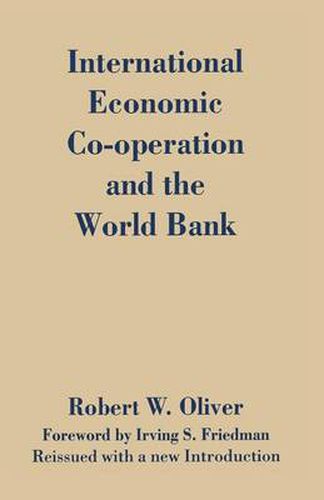Readings Newsletter
Become a Readings Member to make your shopping experience even easier.
Sign in or sign up for free!
You’re not far away from qualifying for FREE standard shipping within Australia
You’ve qualified for FREE standard shipping within Australia
The cart is loading…






This title is printed to order. This book may have been self-published. If so, we cannot guarantee the quality of the content. In the main most books will have gone through the editing process however some may not. We therefore suggest that you be aware of this before ordering this book. If in doubt check either the author or publisher’s details as we are unable to accept any returns unless they are faulty. Please contact us if you have any questions.
On December 14, 1945, the House of Commons voted 314 to 50 to ratify the Agreements negotiated at Bretton Woods, New Hampshire, nearly a year and a half earlier. Lord Keynes had returned from Washington to defend the Fund and the Bank, of which he and Harry White were the principal authors, as well as to justify an American loan to Britain - following President Harry S. Truman’s abrupt postwar decision to terminate all land-lease assistance to its wartime allies, an event which induced the Conservative MP Robert Boothby, to declare: ‘This is our economic Munich’. Today, fifty years later, virtually all the governments of the world have become members, and the capital subscriptions have increased many fold. But questions have arisen. Perhaps the Fund and the Bank should be merged. Some argue that fifty years are enough, at least for the Bank. Others believe that, while expansion should continue, the emphasis should be redirected toward the alleviation of poverty in Africa and southern Asia. This is an account of the historic events of the interwar years and after. It is also a story about the liberal philosophies of the political economists, primarily British and American, who produced two of the great international institutions of our time.
$9.00 standard shipping within Australia
FREE standard shipping within Australia for orders over $100.00
Express & International shipping calculated at checkout
This title is printed to order. This book may have been self-published. If so, we cannot guarantee the quality of the content. In the main most books will have gone through the editing process however some may not. We therefore suggest that you be aware of this before ordering this book. If in doubt check either the author or publisher’s details as we are unable to accept any returns unless they are faulty. Please contact us if you have any questions.
On December 14, 1945, the House of Commons voted 314 to 50 to ratify the Agreements negotiated at Bretton Woods, New Hampshire, nearly a year and a half earlier. Lord Keynes had returned from Washington to defend the Fund and the Bank, of which he and Harry White were the principal authors, as well as to justify an American loan to Britain - following President Harry S. Truman’s abrupt postwar decision to terminate all land-lease assistance to its wartime allies, an event which induced the Conservative MP Robert Boothby, to declare: ‘This is our economic Munich’. Today, fifty years later, virtually all the governments of the world have become members, and the capital subscriptions have increased many fold. But questions have arisen. Perhaps the Fund and the Bank should be merged. Some argue that fifty years are enough, at least for the Bank. Others believe that, while expansion should continue, the emphasis should be redirected toward the alleviation of poverty in Africa and southern Asia. This is an account of the historic events of the interwar years and after. It is also a story about the liberal philosophies of the political economists, primarily British and American, who produced two of the great international institutions of our time.